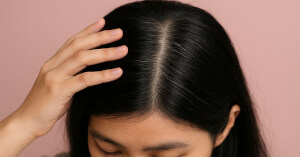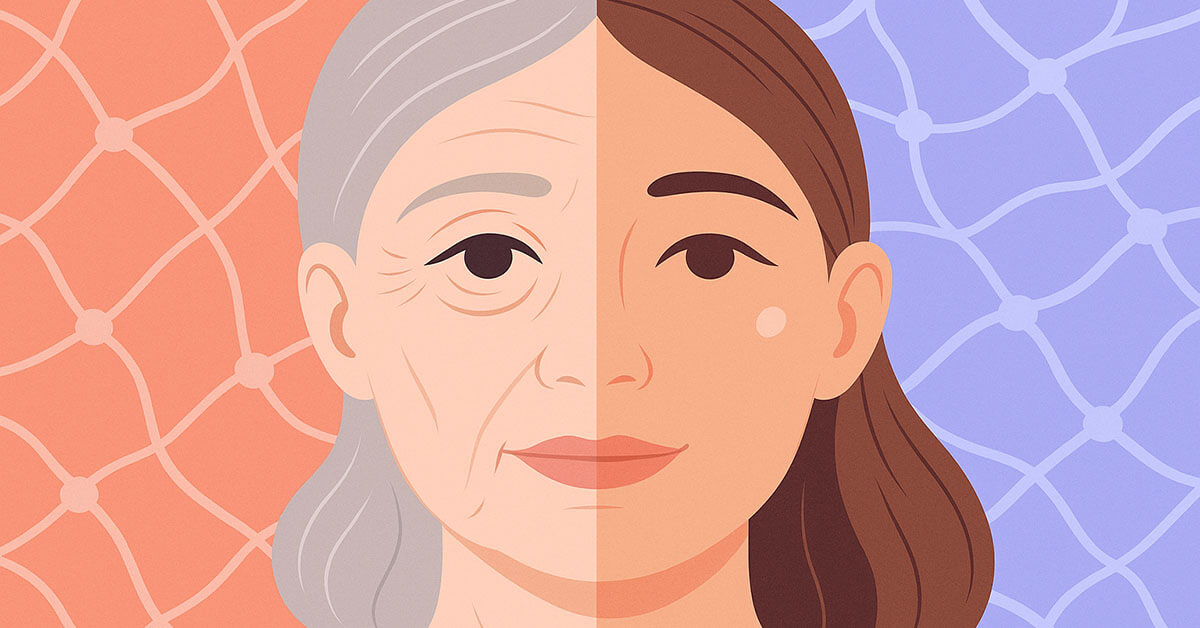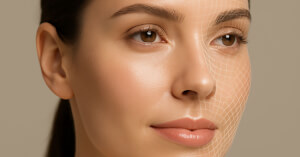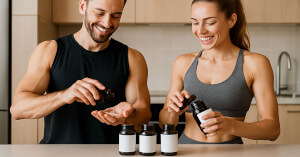
Which Collagen Is Best for Skin and Wrinkles: Type I, II, III, or Peptides?

Collagen has become one of the hottest beauty supplements on the market. Videos about collagen powders, drinks, and gummies are all over TikTok and YouTube, with influencers swearing by their smoother skin and fewer wrinkles. But beyond the hype, what does science say? Collagen is indeed essential for youthful-looking skin, but not all types or forms are the same. If you’ve ever wondered which collagen you should take for skin and wrinkle support, Type I, II, III, or peptides, this article breaks it down clearly so you can make an informed choice.
What Is Collagen and Why It Matters for Skin
Collagen is the most abundant protein in the human body and makes up about 70–80% of your skin. It’s what gives skin its firmness, structure, and elasticity. As we age, starting as early as our mid-20s, the body’s collagen production naturally declines. This slowdown means the skin becomes thinner, less elastic, and more prone to fine lines and wrinkles.
External factors such as sun exposure, pollution, smoking, and high sugar intake can speed up collagen loss even more. That’s why many people turn to collagen supplements, not only to slow the visible signs of aging but also to support the body’s natural repair and regeneration processes.
The Different Types of Collagen
Type I
Type I is the most common form of collagen in the body, making up around 90% of your skin, bones, and tendons. When it comes to skin health, Type I is the star player. It provides structure, firmness, and resilience. Most collagen supplements that target beauty and anti-aging are rich in Type I collagen.
Type II
Type II collagen is mainly found in cartilage, not skin. It plays a crucial role in joint health but doesn’t do much for reducing wrinkles. If you’re taking collagen for skin, Type II is not the type you want to focus on, it’s better suited for people with joint concerns like arthritis.
Type III
Type III collagen is often found alongside Type I in the skin, muscles, and blood vessels. It supports elasticity and tissue repair, making it valuable for maintaining smooth, plump skin. Many high-quality collagen supplements combine Type I and Type III for maximum benefit.
What About Collagen Peptides?
Collagen peptides, also called hydrolyzed collagen, are smaller fragments of collagen that have been broken down for better absorption. Instead of taking whole collagen proteins (which are too large to be absorbed efficiently), peptides make it easier for your body to use the amino acids and stimulate new collagen production in the skin.
Studies have shown that daily supplementation with collagen peptides can improve skin hydration, reduce wrinkles, and increase elasticity after just 8–12 weeks. Peptides can be derived from different sources, including bovine (cow), marine (fish), and chicken. Marine collagen, in particular, is high in Type I and is often considered the most absorbable for skin health. Bovine collagen usually provides both Type I and Type III, making it a strong choice for anti-aging benefits.
Which Collagen Is Best for Skin and Wrinkles?
So, what’s the bottom line? If your goal is younger-looking skin and fewer wrinkles, you should focus on:
- Type I: The main collagen in the skin, essential for firmness and wrinkle reduction.
- Type III: Supports elasticity and works well in combination with Type I.
- Collagen peptides: Offer superior absorption and are clinically proven to improve skin hydration, smoothness, and elasticity.
Type II collagen, while excellent for joint support, is not beneficial for the skin. That means the best approach is choosing a high-quality supplement that contains hydrolyzed collagen peptides, ideally sourced from bovine (Type I + III) or marine collagen (rich in Type I). These provide the most direct benefits for wrinkle reduction and skin health.
Other Factors to Boost Collagen for Skin
Collagen supplements are powerful, but they work best when paired with the right lifestyle. Vitamin C is critical because your body can’t build collagen without it, so make sure you’re getting enough through diet or supplementation. Protecting your skin from UV rays with sunscreen helps prevent collagen breakdown caused by sun damage. Finally, healthy habits like good sleep, a balanced diet, and avoiding smoking and excess sugar will keep your collagen levels higher for longer.
Conclusion
Collagen is a cornerstone of youthful, healthy skin. For wrinkle reduction and firmness, the most effective forms are Type I and Type III, delivered as collagen peptides for maximum absorption. Type II collagen is better reserved for joint support, not beauty goals. Combined with vitamin C, sun protection, and good daily habits, collagen supplementation can make a visible difference in your skin’s texture, hydration, and smoothness. If you’ve seen all the hype on TikTok and YouTube and wondered if collagen works, science suggests that the right type, peptides rich in Type I and III, really can help support skin and reduce wrinkles.
FAQ about Collagen for Skin and Wrinkles
Is marine collagen better for skin than bovine collagen?
Marine collagen is rich in Type I and often has smaller peptides, making it highly absorbable. Bovine collagen provides both Type I and III, which also benefit skin. Both can be effective, and the best choice often depends on personal preference and tolerance.
How long does it take for collagen supplements to work on wrinkles?
Most clinical studies show visible improvements in skin elasticity and fine lines after 8–12 weeks of consistent daily supplementation with collagen peptides.
Do collagen creams work as well as supplements?
Topical creams with collagen usually don’t penetrate deeply into the skin. Supplements with hydrolyzed collagen peptides are more effective at stimulating collagen production from within.
Can collagen supplements replace a healthy lifestyle?
No. Supplements can support collagen production, but diet, sun protection, hydration, and sleep are just as important for maintaining youthful skin.
This article was originally published on Stackbb, your trusted source for science-based supplement guides.







